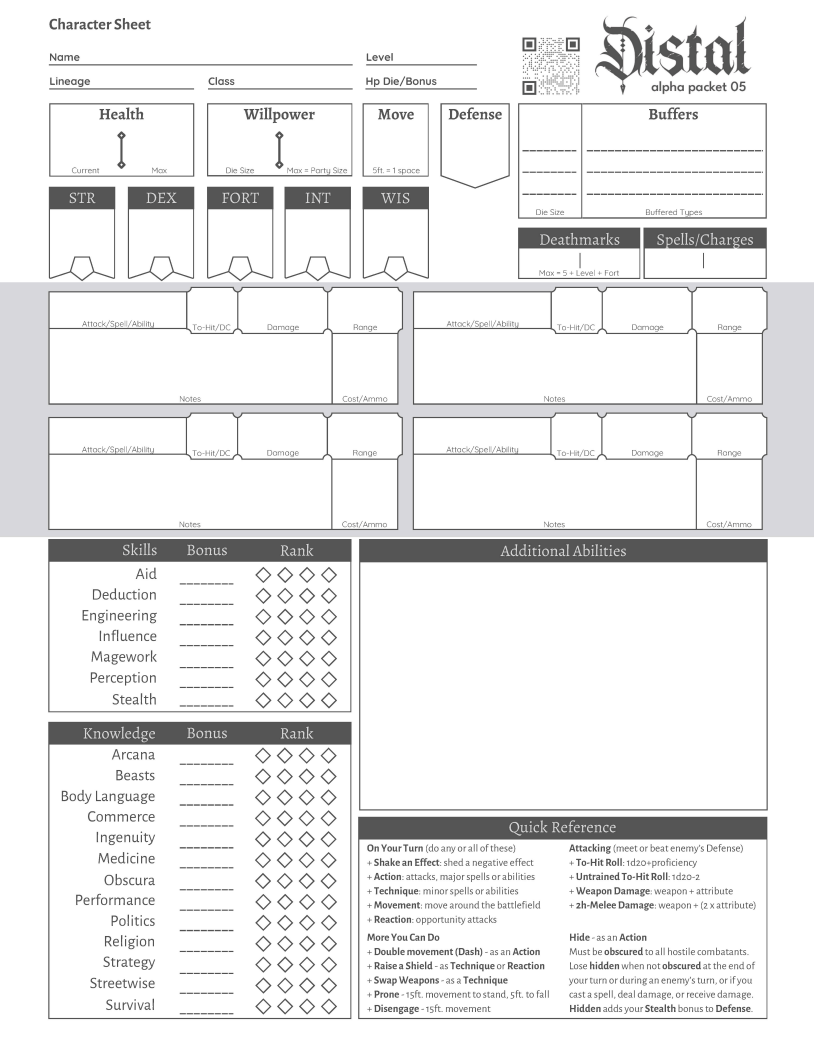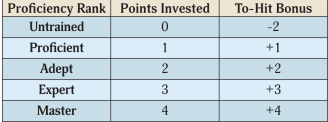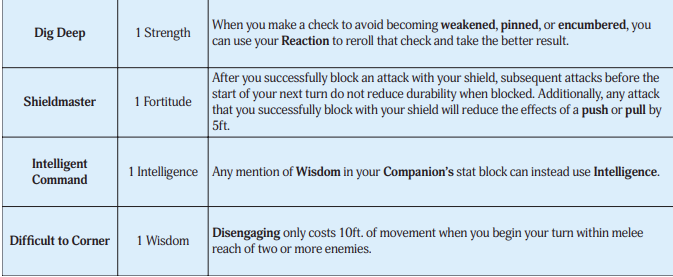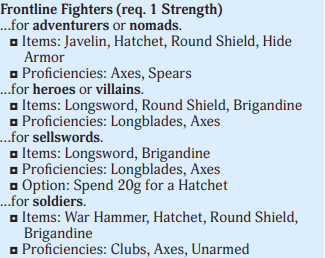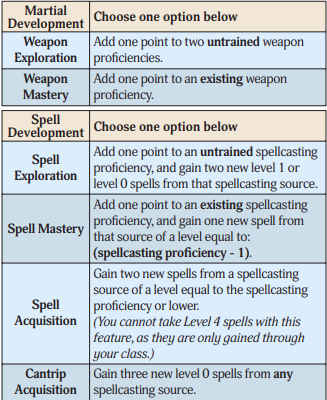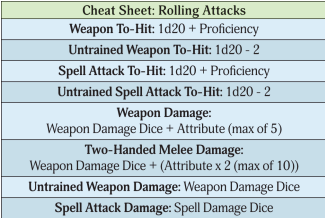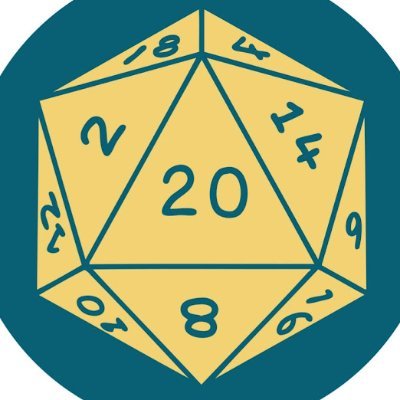
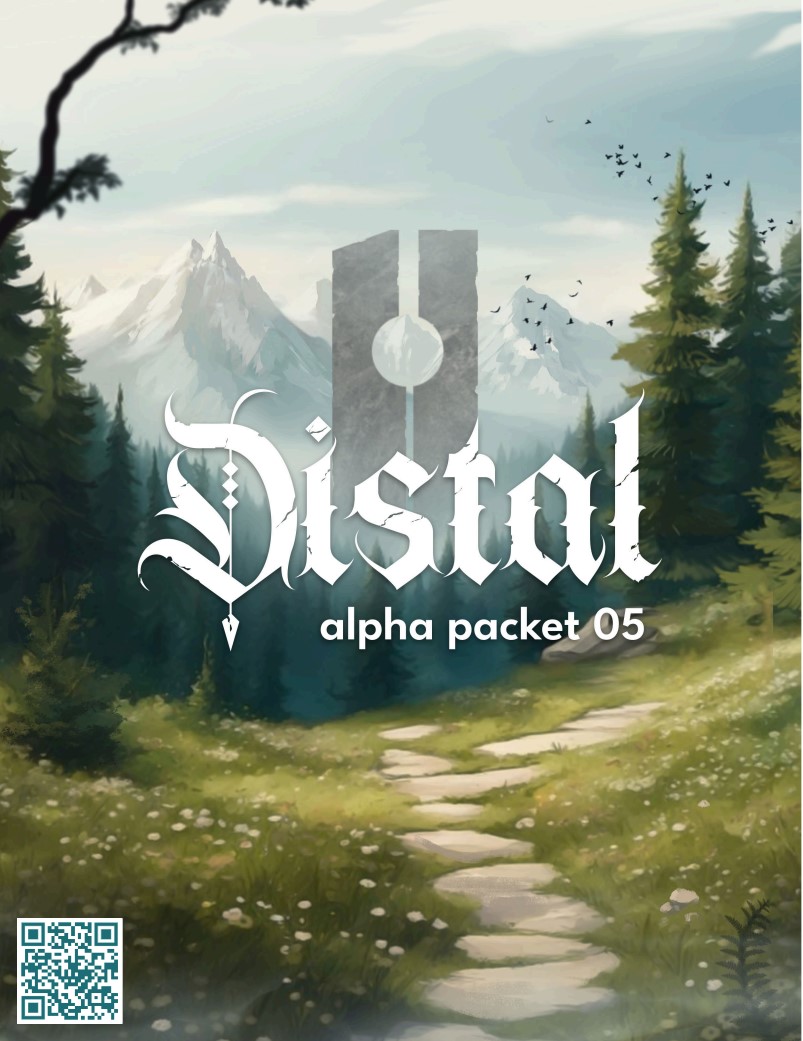

Overview
The game really nails start-up, with interesting Background Prompts and establishing an Organization for the party. There is a fair bit of crunch to the game with keywords, but mechanically it feels lighter than most.
- Thematic
- Character, Party, Rest and Leveling all emphasize the story first. This makes it easier for players potentially to get into the narrative
- Nomenclature
- There are a lot of conditions and phases within the action mechanics that have keywords.
- Fast
- Overall I felt my gaming experience with a large group was quick, and easy to keep moving.

Resolution Mechanic
Roll over d20 system, very similar to DND in terms of resolution mechanic. You are wanting to meet or beat the difficulty class or target number.
Attribute checks are 1d20 + your attribute, but its important to note that there are other attribute rolls that have more player choice. An avoid check is an attribute check, but the player can either use their Dexterity or their Wisdom. The specific keywords are listed here:
- Avoid - Dex/Wis
- Curtail - Fort/Int
- Deny - Int/Wis
- Escape - Str/Dex
- Withstand - Str/Fort
Skill checks can benefit from a players skill level but also their knowledge level. If they have knowledge that can help the roll then they also can add that to the roll.
Character Design
Ancestry/Race/Kin
Atlean Dwarf Elf Furie Kinsguard Tanglefolk Ulsdotter Wildwalker YvainThese lineages will determine things like movement speed (which is based on feet), your starting health, and attribute bonuses. It also gives you specific weapon proficiencies, and some very basic abilities. For example the Dwarf is not effected by armor movement penalty and has some bonus to burdens. Elves are more nimble and can climb faster and jump a bit farther
There are also more powerful Bloodline abilities that you choose after you have finished character creation. This is important because the characters don't truly shape up until after class and attributes are established. The Elf for instance can have any of the following three:
- Unnaturally Quiet - stealh assist, disengaging, etc
- Bough Runner - long jumps, avoid falls, reaction advantage
- Beast Tongue - animals understand you, bonuses to influence or deduction from Wisdom
Organizations
There is an entire section on designing an Organization. This again has multiple prompts, and its purpose is to unify the players from the start. They already know how they came together and what their common goals are.
"Your organization specializes in ---- and prefers to be pain in ----. You are known ---- for ---- and ----. Most call you the --- ----."
"Your organization specializes in espionage and prefers to be pain in useful items. You are known in secret circles for making a mess and applying political pressure. Most call you the Sleeping Gauntlet."
Attributes
Dexterity Fortitude Intelligence Strength WisdomAttributes range from -2 to 5. Establish your starting attributes by your Lineage and then assigning +1 to two different Attributes of your choosing. Your Class establishes which attributes are important to you, so look to those.
You will increase 1 attribute by 1 every level except for levels 4,8, & 12. However, the attribute you level becomes plateaued and cannot continue to go up until your next milestone. Milestones occur every 4 levels.
Intelligence and Wisdom have their own special benefits. For each 1 point in Intelligence you gain an additional Skill, and Wisdom gets you an additional Knowledge. These don't improve your current Skills/Knowledge, but grant you a new one at rank 1.
Skills
Your skills are only provided by your background when making a character. Each Skill/knowledge has 4 ranks (proficient, adept, expert, master). These equate to +1-+4. These are added to the d20 when rolling.
When you level up you can improve current skills/knowledge or gain new ones. You need to invest a number of points into a skill to get to the next rank (it takes 2 points to become adept, 4 to become a master).
Combat Proficiencies
Important to note that when you are untrained in something you will have a -2 to that check. I am not sure if this is the same with Skills and Knowledge.
When you don't meet the Attribute requirement for a weapon you are considered unskilled with that weapon.
Background
For backgrounds you have a series of prompts that you roll for to construct your background. Each prompt provides thematic flavor and benefits. The madlibs style statement you are filing in is...
"I grew up ———, and my days were spent ———. I became ——- the day ———-."
As an example you might roll ”in a traveling circus” for your first prompt. This would give you bonuses to Commerce, Performance, and you would receive a Professional Contact. An example background I rolled was...
"I grew up on the streets and my days were spent attending fancy gatherings. I became an adventurer the day I unlocked an ancient ruin".
The player then fills in the meaning behind this. Was I a con-artist sneaking into parties, or a servant who attended gatherings helping serve food? The bonuses you receive from this background I rolled would be:
- +1 Streetwise knowledge
- +1 Body Language knowledge
- +1 Criminal Contact
- +1 Influence skill
- +2 Politics
- +1 Aristocrat Contact
- +4 Low priced items
- +30 gold
- +2 Weapon Proficiencies
- +1 Engineering skill
- +1 Obscura knowledge
- +1 Ingenuity knowledge
- +15 gold
Some backgrounds might give you a Curio. I mention this again in Modifications to Resolutions, but it’s a thematic item that allows you to reroll a non-combat check that makes thematic sense.
Class / Profession
Berserker Cutpurse Elementalist Embergut Ferryman Jester Justicer Magister Oracle StrategistThese come in different Archtypes that describe playstyles you might enjoy: Brutal Fighter, Skirmishing Fighter, Ranger, Roguish, Frontline Caster, True Caster.
Classes grant increases to health, and establish your Willpower Die (more in resolution). They also will suggest what Attributes will be best for you. You also will get access to other features like: Specialties, Martial Developments, Techniques, Spell Development, Powers, and additional Proficiencies.
Some classes will have special keywords or metacurrencies that focus on their abilities. The Jester has Prestige, which is an active condition that allows them to do things.
Abilities/Power/Feats
Contacts
You receive these from your background. These end up being NPCs that can either be a nemesis, ally, mentor, etc. The purpose of these is to propel the character's story, give character's something to interact with, and provide value to the overall narrative. These have multiple tables based on the background that you receive a contact from, and they also have a madlib's style sentence to complete.
"they are --- that is --- and can ----." example: they are a smuggler that is difficult to look upon and can acquire illegal goods.
Specialties
These are similar to Feats in the DND 5e system or Pathfinder 2E. There is a nice robust list for players to choose from, and they even feel similar to the Feats in EZD6 which can really drastically change your character's playstyle. You receive one of these at every even level.
Powers/Features
Each class has 6 levels of interesting powers and features that add a lot of flavor to how that class plays. If we look at the Berserker, which is a Brutal Fighter Archetype, we can see some of the powers it has.
- Bloodrush - movement increased 5ft while Bloodied and gain Headbutt Ability
- Headbutt - a Technique that allows you to have a natural weapon attack. This means you have a second attack on your turn
- Recklessness - Reaction to a melee attack that would miss you, guarantee it hits you and make a counter weapon attack of your own.
- Bloodied Response (4th) - Once per round while Bloodrush is active you can use Recklessness without expending your Reaction.
Techniques
This is a part of the Action economy. Each round you have 1 technique you can use for free. These are usually minor actions that you gain access to through your Class
Equipment / Gear
There are very nice and tidy start kits available for each of the Archtypes of playstyle. The Frontline Fighter receives the following.
There is a distinction between holstered and stowed items. You can holster three hands worth of weapons and up to three tiny items. Everything else is considered stowed inside a pack
In addition to the starting pack you can purchase equipment based on the money given to you from your Background. Combat Equipment might have requirements based on your Attributes. If you don't meet the requirement then it is considered untrained if you are trying to utilize it.
Some items will have Weapon Properties. There are recognizable tags such as: Range, Reach, Two-handed, throwable, etc. But some new ones as well...
- Safe to Allies - avoid damaging targets of your choice
- Strapped/Braced - no allowing it to be disarmed Armor also has Armor Properties which is a nice addition. As an example Tag you have:
- Fitted - attribute cost is reduced by 1 to where it.
Burdens are things you accrue if you are carrying too much stuff. This will either encumber or restrain you based on how much you are carrying.
Advancement
In order to level up your need to undergo trials. These are experiences, not experience points. To get to 2nd level you must have gone through 2 trials. Then to get to 3rd you need another 3 trials.
You gain trials automatically at the end of each session. However, other trials might be awarded by the GM based on character stories, conflict, and consequences for a particular character. Coming close to death or overcoming a difficult boss might be a trial. If some party members outpace others in levels they can assist or mentor those members to help them gain levels.
Trials also serve double duty. You spend trials to gain ranks in skills and knowledge. This occurs between sessions. Spending of them does not erase them from your character sheet, and you do not go down in levels as you spend them. Each rank of a skill requires that many trials to be reached. Going from rank 1 to 2 requires 2 trials.
When you gain a new level check your character class for improvements in: specialties, martial developments, and spell developments
Health increases only at milestone levels, levels 4, 8, and 12. This means that the game will have a pretty static damage state for most of the game.
You will increase 1 attribute by 1 every level except for levels 4,8, and 12. You also cannot choose the same attribute to increase until you have passed a milestone level. The attribute is considered plateaued until you do.
Classes will determine when you will receive Martial or Spell Development. These are fast and easy ways to rank up your abilities in weapons, opposed to using trials with Skills and Knowledge.
Combat
Initiative
Staggered InitiativeStaggered initiative order. Each side will alternate taking turns with one of their combatants. Player then GM, then Player again. Which side gets to go first is based thematically on which side was the aggressor in the encounter. If that is hard to determine then a skill check of some sort is asked for.
Once this turn order is established it will be the same each round. It will not be the players choice every round of combat to determine a new order.
A Surprise Round is an extra action prior to the creation of a staggered order.
Turns / Rounds
Each player gets 1 turn in a round. A round consists of all combatants getting their full turn.
Action Economy
- Shake an effect - Attempt to get rid of a condition, or escape a graps, etc
- Action - attack, cast spells, pick up heavy stuff, etc
- Movement - move a number of feet based on lineage (and Specialties perhaps)
- There are specific rules for Jumping, climbing, gliding, flying, disengaging, being prone, burrowing, etc
- At-will - Free to perform abilities/spells/features
- Reaction - 1 reaction per round, refreshes on your turn but is used on other's turns
- Technique - Small effort of some sort - swap weapons, command companion, minor spells
Important to note that Opportunity Attacks do exist in this game. You only get as many opportunity attacks as you have Reactions.
Attack Mechanic
Attacking is as simple as rolling 1d20 and adding your proficiency bonus for the weapon you are rolling. Weapon damage is then rolling the weapon's damage and adding your attribute to the damage result. If you are wielding a two-handed weapon you double your attribute value.
If you roll a 20 on a d20 and get a critical strike you then roll the weapon dice damage twice, and add the attribute bonus twice.
Defensive Mechanic
You have a Defense value that the enemy is trying to meet or beat to hit you. Once you are hit then you will determine how much damage you take based on your potential armor.
Armor does not require proficiency, but it does require the Attribute to wear them. If you do not meet the requirement you are considered untrained and take debuffs.
Armor types have different Buffering Dice associated with them. These are Usage Die that reduce incoming damage by the amount rolled. The dice are also associated with specific damage types. If you have an armor type that only buffers piercing and take slashing damage you cannot use it. However, if you have d6 against slashing you can then roll the Buffering die, and reduce incoming damage by the result. If you roll a 1 then the die steps down like a Usage Die. In this system they refer to these as Dice Chains instead of Usage Die.
Using a shield can either be done as a Technique on your turn, or as your Reaction. Your Defense will then increase by the shield's block value. Regardless of it being raised or not you can still use its Buffer value to reduce damage.
Modifications to Resolution
Luck / Reroll Bonus DieThere are two main mechanics to help modify your die roll. Advantage/Disadvantage, and bonus die. Curios and different powers might grant Advantage, and Willpower die act as Bonus Die for your attack results.
Curios
Some backgrounds have curios. These are thematic items that you can use to get bonuses on skills rolls. Firstly the Curio must make thematic sense on how it can help you. Then you can roll a second d20 and take the result you prefer.
Willpower Die
You gain 1 of these at the beginning of combat. This is only used for combat encounters. The size of the die (step) is determined by your class, and you can only accrue as many Willpower Die as the party size.
You gain these willpower die also when you defeat a noteworthy enemy, or if some objective is completed. You lose these willpower if you begin dying.
Willpower die can be rolled and added to your attack value. This is done after the attack roll. You can also use this Willpower die to boost an attribute check to stabilize a fallen ally.
Conditions
There lots of specific conditions that have specific statuses on players. Effecting movement, and abilities
Environment
There are different weather conditions in the game that will effect your players and their access to downtime mechanics. They might also add conditions like fatigue, weakened, slow, poisoned based on what is happening.
Resource Management
Time or Scenes
There are 3 cycles in a day; morning, noon, night. The party can take an entire cycle to perform a downtime. They can perform 1 major downtime activity or 3 minor ones. If you are devoting that time to something else you only get 1 minor downtime (part of the morning scouting or hunting for NPCs).
During downtime you will have natural recovery, which is rolling your health die + fortitude and regaining that in Hit points. If you also have a Good Meal with Friends you will get 2x your max health die + fort.
There is an interesting mechanic called Good Meal with Friends. This is a time for players to RP and tell stories about their characters, reveal secrets, etc. This can only occur during the night timeblock, and during this players will take different minor and major actions. This is also when players can help other players level up who might not have earned trials on their own yet.
Resource
You gain 1 of these at the beginning of combat. This is only used for combat encounters. The size of the die (step) is determined by your class, and you can only accrue as many Willpower Die as the party size.
You gain these willpower die also when you defeat a noteworthy enemy, or if some objective is completed. You lose these willpower if you begin dying.
Willpower die can be rolled and added to your attack value. This is done after the attack roll. You can also use this Willpower die to boost an attribute check to stabilize a fallen ally.
Health & Dying
This is standard hit points. When you are reduced to half of your health you require a status called bloodied. When you reach 0 HPs you are considered dying.
When you begin dying you immediately receive a Deathmark. You are also changed in initiative to the beginning of the round (this means if you are knocked out on an enemies turn before you, you wait until the start of the next round before you have a Consequence.)
Each round after this you are going to receive another Deathmark. Each player has a number of deathmarks equal to 5 + Level + Fortitude. In order to revive a player you have to heal them more than their current Deathmark number. If you can't heal you can aid the healing player, but there is a DC check that is also based on the Deathmark rank (10+Deathmark).
These deathmarks are considered permanent scars. For each one you have you must remove a skill bubble marked but your total hit points will go up by the number of deathmarks you have. The player can narratively describe what the scar is and how it effects their skill being reduced.
While a player is down they have Death Actions.
- Reaction to roll a d20 and let a player use that result instead of the one they rolled
- Reaction to increase an ally's movement by 10ft
- Reaction to buffer an ally's damage by d6
Magic System
The main mechanic for spellcasting are spell slots. Every spell has a Source associated with it. You need to have access to the source the spell uses in order to cast it. Next, you need to have the right amount of spell slots. A Level 0 spell is free, but a Level 1 spell requires 1 spell slot. A level 2 spell requires 2 spell slots. Spell slots themselves don't have levels associated with them. The level of the spell is letting you know how many slots you are required to cast them.
You gain new spells through Character Advancement
GM Guide
There is a really nice section that discusses how to establish your first session. It goes through the purpose of play, developing an organization, how to build a one-shot, and more. It really tries to ease the player into the process.
For encounters there are Tables for generating adventure purposes, different battlefield/encounter objectives and layouts, and more.
There is also a nice and brief section on Character Retirement. This is interesting because its not just for player death, but for players who maybe accrue too many Deathmarks, or potentially if player's just don't want to use that PC anymore.
Other things of note are sections for: Nonviolent resolutions of encounters, Companion rules, How to Manipulate Objects, different rules for Movement, Crafting Equipment and Items, and then how to have a Profession to earn income.
Finally the game has its own Lore system that you can utilize, and it goes into details of this system at the end of the Alpha packet.
Character Sheet
